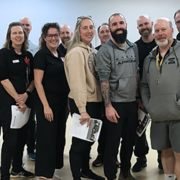Physical literacy training empowers PL4C observers in Atlantic Canada
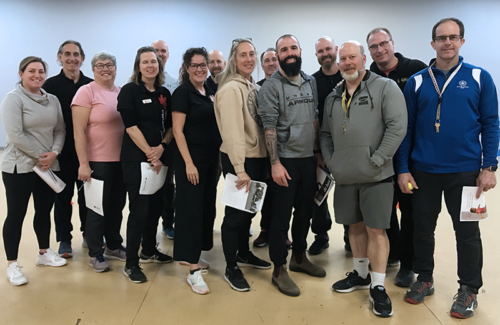 Thanks to mentors from the Physical Literacy for Communities (PL4C) project, teachers, recreation instructors and physical activity leaders are being trained in physical literacy observation in Atlantic communities using PLAY Tools. Participants are being empowered to share what they’ve learned with other instructors using a train-the-trainer model, improving the leadership and culture around physical literacy awareness in Atlantic Canada.
Thanks to mentors from the Physical Literacy for Communities (PL4C) project, teachers, recreation instructors and physical activity leaders are being trained in physical literacy observation in Atlantic communities using PLAY Tools. Participants are being empowered to share what they’ve learned with other instructors using a train-the-trainer model, improving the leadership and culture around physical literacy awareness in Atlantic Canada.The PL4C project, which is supported financially by the Public Health Agency of Canada and delivered by Sport for Life, has a mentor-led approach in 26 PL4C communities across Canada. Facilitation, leadership, mentorship and advice, project planning, as well as tracking and reporting are provided by regional mentors and associate mentors, the latter who are nominated from each PL4C community. With guidance from Sport for Life’s trained observation experts, PL4C communities train leaders to become physical literacy observers who work directly with schools, recreation programmers, and other leaders to observe students with the support of PLAY Tools. In doing so, they build capacity for further observation of physical literacy.
In Atlantic Canada, observation training kicked off over two days on February 13-14 in Miramichi and Kent County, New Brunswick, one of three PL4C communities in Atlantic Canada. Observation training is being scheduled in Port Rexton, Newfoundland and Labrador, and in Prince Edward Island, later in 2023.
For Joe Doiron, PL4C’s Atlantic regional manager, a highlight of the training so far has been seeing the ways that young people have been engaged through the process.
“Seeing school children so genuinely interested in participating in fundamental movement skills, and experiencing their excitement at helping their teachers learn about physical literacy observation and assessment, that was the best part for me,” said Doiron.
“It was inspiring to experience the high level of commitment, enthusiasm and interest among physical and health educators, recreation specialists and other community volunteers in embracing physical literacy observation as a new tool to support their students and participants to be active for life.”
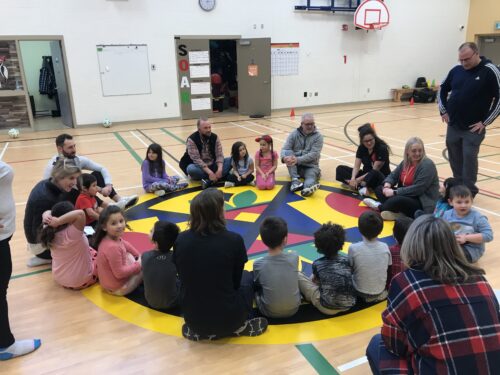
One size doesn’t fit all
Because the PL4C initiative involves different communities of varying sizes and cultures, Sport for Life organizers knew that they couldn’t take a cookie cutter approach to training observers – they needed to custom-design their approach to meet the needs of the community.
“Having the educators learn about physical literacy observation together was very impactful. It provided opportunities for them to observe kids together and share thoughts in terms of how they can implement this tool into their practice and teach other teachers,” said Liz Herbert, Manager of National PLAY Assessments.
“We had some really insightful conversations around how to use the tool with different age groups and in different settings, and there was a great discussion about how to refine the physical literacy observation process to make it work for a diversity of settings and students – not one size fits all.”
This was especially apparent when the PL4C initiative jumped the language barrier, reaching French language minority communities in Miramichi and Kent County. For Mariane Parent, one of the francophone trainers for the project and PL4C’s regional manager in Quebec, it was a unique opportunity.
“I loved connecting in French with people who value physical literacy and professional development. My highlight was questioning and challenging their observations while they were getting trained. It got us to very interesting conversations on movement, sequences and what they observe in their daily work with kids,” she said.
“I was getting them back to why they are doing this.”
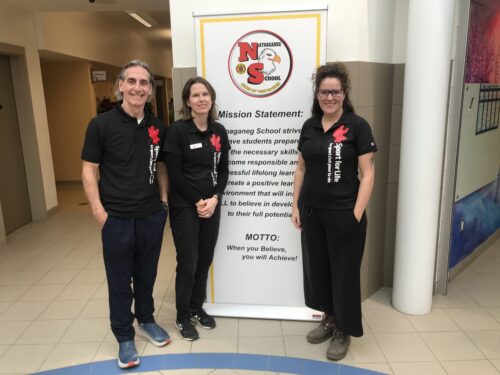
Mentors making new mentors
In Miramichi and Kent County, New Brunswick, physical literacy instructors provided in-class and practice training for the teachers and recreation programmers. The training utilized the PLAYbasic tool, one of a number of physical literacy observations that can be used with children and youth in different contexts. PLAYbasic breaks down five fundamental movement skills for observation: running, hopping, throwing, kicking, and a balance activity.
The training team also included partner table member Jim Watters and community mentor Eddie Pinder – both of whom have previous experience teaching physical education within the school system, and Ray and Tobi Desveaux, PL4C associate mentors with a wealth of experience in training and coaching. For Pinder, who is retired as the physical education lead for the Anglophone North School District (ASD-N) and has seen some significant changes to the curriculum during his career, participating in the observation training was a chance to reconnect with the school system.
“We basically organized getting the teachers from the various schools and the students who came to be the test cases for the observational training. And then on the second day we went through some training sequences looking at how to go about observing, how to mark on the graph where they were at from zero to 100,” he said, mentioning that they worked with a Grade 5 class, a Grade 3 class and a Kindergarten to Grade 3 class.
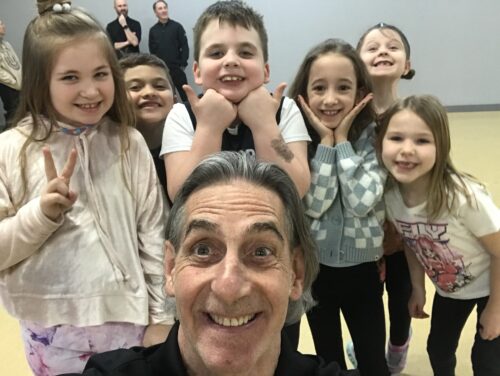
“Both days went well and on the second day we were able to have three of the four local First Nations schools take part, so that was great.”
According to Watters, who is currently the physical education lead for ASD-N, the teachers who participated gained confidence through the experience.
“A lot of people, when they come to trainings—especially when they have to demonstrate or do activities—there are some nerves and they’re not sure about expectations. That quickly disappeared with everyone who attended,” he said.
“Once they were walked through the process, and watched Liz and Mariane work with the kids, they saw it was something they could easily do. They walked away at the end of the day empowered to take it and run with it at their schools, and they felt they were ready to take what they had learned and implement it right away.”
Ray and Tobi Desveaux were also thrilled by how the process went.
“Everyone is needed – like parents, grandparents, fitness instructors, educators, business people, community leaders. We all need to be behind it and take an integrated approach, because it’s such a huge issue, right?” said Tobi.
“You know you want to make the healthy choice but it’s not always the easy choice.”
Ray felt invigorated by the process, having not worked with children in some time.
“It was nice to be back around those kids, because I was thinking maybe my methods are old and obsolete. But you still get down to their level and really connect with them, and just really enjoy the time you spend with them.”
For Doiron, that’s what this entire training process has been about. He feels it’s a successful model that can be applied to other Atlantic PL4C communities in the future.
“Everyone seemed to really value doing this professional development training together, and I loved seeing all the old connections rekindled and new connections formed. There has been incredible leadership from the Miramichi and Kent County PL4C table to put this all together. And it’s so great to see practitioners and leaders who care so much about kids’ health and well-being. It’s clear that the observation training is a successful model to apply in other Atlantic PL4C communities in the future.”

